Basic Science of Immunology - Adaptive Immunity
Session: Immune Mechanisms
Stimulated CD4+ T Cells Initiate Blood Coagulation Through Polyphosphate Release
Thursday, June 26, 2025
4:55pm - 5:10pm East Coast USA Time
Location: Salons H-K
- RM
Reiner K. Mailer
PI
University Medical Center Hamburg-Eppendorf
Hamburg, Hamburg, Germany
Presenting Author(s)
Abstract Text: Chronic inflammatory diseases are associated with an increased risk for thrombosis, but the contribution of T cells to activate coagulation factors is poorly understood. We found that CD4+ T-cell stimulation promotes the generation of inorganic polyphosphate (polyP), that links phosphate units by phosphoanhydride bonds to form long biopolymers. Corresponding to its intracellular accumulation, polyP levels increased on the surface of stimulated T cells and triggered the activation of coagulation factor XII in chromogenic cleavage assays. Moreover, the addition of stimulated, but not naïve, CD4+ T cells increased thrombin generation and decreased clotting time in a polyP-dependent manner in murine whole blood thrombography and mechanical coagulometer analysis, respectively. In line with the pro-coagulant role in vitro, we found that systemic T-cell stimulation promotes thrombus formation in a venous thrombosis model in vivo. In human blood, flow cytometric analysis revealed that membrane-bound polyP increases on the surface of CD62L-CD44+ effector memory T cells. Furthermore, elevated polyP levels were found on CD4+ T-cell populations that react specifically against corona virus SARS-CoV-2-derived peptides in comparison to cells restimulated with cytomegalovirus-derived peptides or de novo stimulation with superantigen, indicating that antigen-dependent differentiation delineates polyP release by T-cell subsets. In summary, we found that stimulated T cells contribute to polyP-dependent FXII activation that initiates thrombus formation via the intrinsic coagulation pathway. Our results provide new insights into T cell-driven immunothrombosis and may help to elucidate the increased risk for thrombosis that is associated with chronic inflammation and virus infections.

